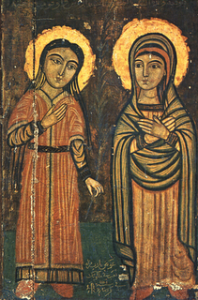It occurred to me when preparing to write this blog to tell you about spiritual guidance and what it means. To do so, I need to give you a very brief overview of its history.
Spiritual guidance has several titles such as: “Spiritual Direction”; “Spiritual Accompaniment” or Anam Cara (Soul friend, in Irish). It has been around since old testament days. Indeed St. Paul and his letters to the various new converted communities were in essence, spiritual guidance and accompaniment. However, it was the Desert Fathers and Mothers who began to formalise the practice around the years 350 A.D.

Once the persecution of Christians came to an end (known as “Red Martyrdom”), the Desert Fathers and Mothers sought to live more fully the great command: “You shall love the Lord your God with all your heart, and with all your soul, and with all your strength, and with all your mind, and you shall love your neighbour as yourself.” (Luke 10:27, Dt. 6:5, Lev. 19:18).
They chose to live in the deserts around Egypt, Syria and Palestine living lives of solitude, stillness and silence. This became known as the “White Martyrdom”. Among the more famous of these Fathers & Mothers were Amma Matrona, Amma Sarah, Amma Syncletica and Amma Theodora with Evagrius of Pontus and St. Anthony of Egypt. These characters are well worth a Google search!
As I’ve just mentioned, the practice of spiritual guidance is rooted in Scripture and ancient history. However, the process of spiritual guidance and indeed companionship that I am more familiar with while contemplative in practice, it is not as austere as that of the Desert Fathers and Mothers.
We all know that surrendering to the Lord in our lives is not only a daily practice but a lifelong practice. The fundamental purpose for such surrendering is to allow the Lord reveal His holy story through, with and in our lives. Spiritual guidance is all about listening to this unfolding Divine narrative in the company of another, which evokes transformation of the ego from self-centredness to Self-centring – meaning God-centring. You see “to listen to one another in this way is indeed to be a lover of souls”.[1]
As I outlined above, spiritual guidance has been an integral part of the Christian Tradition. For example, Exodus 6:7 “I will adopt you as my own people and I will be your God”. This Divine commitment or covenant to be our God, is the actual cornerstone of spiritual guidance. It offers an incarnational space or container to hold and listen to God’s revelatory story. In this regard, the spiritual guide or companion, fulfils three roles:
1) A contemplative, compassionate listener which by its nature, requires an emptying of oneself in order to be available to listen to the Holy Spirit. 2) A contemplative presence for the guidee where one believer helps another believer respond to God’s action in his/her life. 3) Holding this trinitarian relationship between guidee and Holy Spirit, the guide enables the spiritual narrative to flow – oscillating between listening to the guidee and silence. It is the silence which serves to support the guidee or his/her soul to really hear what the Spirit is revealing.
You see, the process is not a solution-focused therapy but rather one where the guidee is facilitated to listen to his/her own soul while its narrative is witnessed, validated, and shown solidarity by the guide; the outcome leads to healing, freedom and a growth in the awareness of the movement of God. This awareness of God’s movement in the guidee’s life, reveals His continued covenant to her/him.
Thus affirmed, the guidee returns to the community holding within his/her heart not only God’s commitment but the fruits of healing, freedom and growth. These fruits are expressed by being in service with those s/he are called to serve and then in turn, the guidee can then offer the hand of Anam Cara to others.
I hope this very brief overview has given you a sense from where spiritual guidance has emerged and the importance of offering each other spiritual companionship.
[1] Wendy M Wright, Desert Listening in Communion, Community, Commonweal: Readings on Spiritual Leadership ed. by John S. Mogabgab. (148-156. Nashville: Upper Room Books, 1995), 130.

